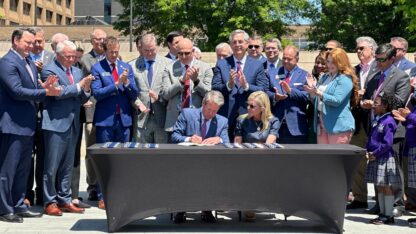Georgia Governor Brian Kemp is sending additional National Guard troops to the U.S.-Mexico border in Texas this spring.
This comes after both the state House and Senate, along party lines, approved resolutions supporting increased policing at the border.
“To be clear, the crisis on the border is a national problem and it demands a national solution if the Biden administration continues to fail the American people,” Kemp said at a press conference Tuesday. “Today we reinforce our commitment to keeping Georgians safe, but also the right of the states to defend themselves against threats when an administration in Washington is not willing to step up and lead.”
Kemp sent National Guard troops to the border for the first time in 2019, and Georgia Guard members have remained at the border since. The governor said Georgia is the only state to have had that longevity and commitment to keeping guardsmen at the southern border. Kemp spokesperson Garrison Douglas said there are currently 29 guard members there who are working on an unmanned aerial surveillance mission.
The troops deployed this spring will include engineers who will aid the Texas Guard in building a forward command post. The governor estimated an additional 15 to 20 people will be sent to Texas.
Kemp has visited the border five times since taking office. He joins governors from Oklahoma, Florida and Indiana in sending National Guard members to the Texas border as Texas Governor Greg Abbott is clashing with President Joe Biden about the state’s ability and right to police its borders.
Kemp emphasized that his concerns at the border include preventing drugs like methamphetamine and fentanyl from coming into the country, in addition to slowing the number of illegal entrances to the U.S.
On Monday, the state Senate passed S.R. 543 to support increased protections at the southern border. Hours before Kemp’s announcement on Tuesday, members of the House approved an identical resolution, H.R. 1019. Both chambers split across party lines, underscoring the significance immigration will have in the coming presidential election.
Georgia Representative Ruwa Romman spoke first in opposition to the resolution. Her district in Gwinnett County covers several communities where immigrants call home.
She said she is concerned about what the resolutions say about the nature of politics in the state because they put forth politicized points that are not all factual in a way that mimics national political talking points and neglects to acknowledge the humans involved.
“I know that sometimes we end up so caught up in our political atmosphere that we forget there are real implications both legal and other implications for real people,” Romman said. “When we start talking about mobilizing the National Guard in certain states against federal agents, that should be concerning. What precedent are you setting?”
U.S. law allows for migrants to seek asylum at the border.
In 2020, former President Donald Trump closed the U.S.-Mexico border by invoking Title 42, a public health measure intended to stop the spread of disease. People still managed to illegally pass through the border during that time, with 400,651 apprehensions in the 2020 fiscal year — about half of the apprehensions from the year before.
In response to lifting Title 42, the Biden Administration in 2023 narrowed the scope of who is allowed to ask for asylum at the border. If people are passing through another country before seeking asylum in the U.S., they must apply for asylum in those countries or ask for safe harbor permissions to continue to the U.S. People can only ask for asylum if they pass through a legal port of entry, or they can apply for an appointment to enter using a new mobile app.
Kemp said the Georgia Guard will work under the guidance of the Texas Guard.
“They can only do so much in absence of federal support,” he said.









